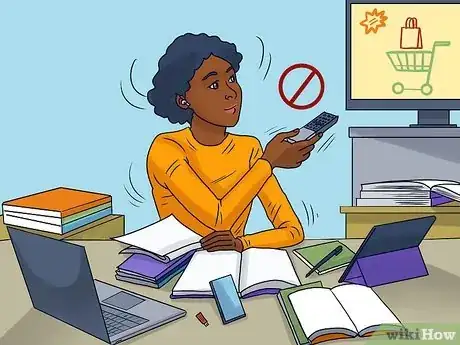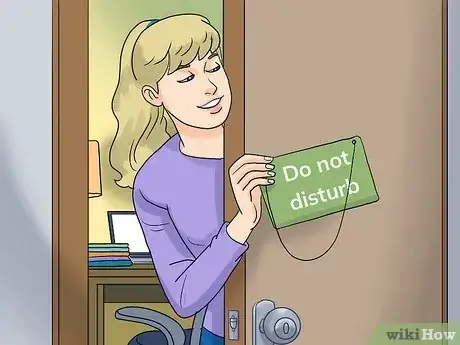This article was co-authored by Ashley Pritchard, MA. Ashley Pritchard is an Academic and School Counselor at Delaware Valley Regional High School in Frenchtown, New Jersey. Ashley has over 3 years of high school, college, and career counseling experience. She has an MA in School Counseling with a specialization in Mental Health from Caldwell University and is certified as an Independent Education Consultant through the University of California, Irvine.
wikiHow marks an article as reader-approved once it receives enough positive feedback. This article received 95 testimonials and 100% of readers who voted found it helpful, earning it our reader-approved status.
This article has been viewed 757,557 times.
You know you really want to get good grades. Your parents have put the pressure on, or you promised yourself you would do better. But you keep getting distracted! If you work to find a focused mindset, establish a study schedule, and choose the right place to study, you can cut out the distractions you have control over and minimize the ones you can't stop completely.
Steps
Easy Tips for Better Focus
-
1Tune out specific distractions as you notice them. Say you're trying to study in the library and you keep getting distracted by someone texting. Take note of this specific distraction then tell yourself you are going to overcome it. The next time you see it happen, will yourself not to look. Keep doing this every time the distraction comes up, and eventually you will no longer notice it.
-
2Give yourself a worry break. Life can get really busy, so it's no surprise if you find yourself distracted from studying by thoughts about everything else. Rather than acting like all of those other needs don't exist, give yourself an outlet. Spend 5 minutes thinking about everything that's on your plate, but then tell yourself it's time to focus on the main task for now: studying.Advertisement
-
3Prioritize your studying by setting a main goal. When you've got an exam coming up, it's easy to think you need to study everything. Breaking things down and establishing just one primary goal makes things more manageable and you will be less prone to becoming distracted.[1] [2]
- For example, if you have a biology exam coming up that covers three chapters, you don't have to cram everything into one study session. Try focusing first on the parts that give you trouble, like that subsection on the Krebs cycle. Also try making notes and flashcards as it helps.
-
4Go off the grid. Texting, social media, calls, and other distractions that come from our electronic devices are some of the biggest barriers to staying focused when studying. Luckily, the fix is easy and totally within your control. Unplug yourself![3]
- Turn off notifications on your devices. (If your device has the “Do not disturb” mode, try using that.) Better still, turn them off completely.
- Don't take calls or texts. Turn off your phone if you are able, or at least keep it on silent and away.
- If you can't stop this distraction, look into apps or browser plugins that can block social media, certain websites, or any other specific outlets that pull you away from studying.[4]
- Try keeping your phone in another room so you're less likely to use it while you're studying.[5]
-
5Work with your energy levels. It's natural to want to procrastinate and put off the most difficult or unpleasant tasks. Your energy level at the start of a study session will be higher, however, so it's actually best to begin with the harder things. Put off the easier tasks instead. This will keep your focus sharp when you need it most.
-
6Take a brief study break now and then. It might seem counterintuitive, but stepping away from your studies now and then can actually be more beneficial than trying to plow through everything without stopping. About once an hour, get up and take a short break of about 5 minutes. This helps refresh you so that you can stay focused when you come back to studying.
- Moving around a bit, such as by taking a brief walk, will be most beneficial.
-
7
-
8Keep yourself on track with the “be here now” technique. Whenever you feel your attention begin to wander, stop and tell yourself to “be here now.” You may have to do this several times, but you will be gently reminding yourself that you want to focus on the task at hand.
- If you do this consistently, you should find that you gradually spend less and less time being distracted.
Hacking Your Study Schedule
-
1Set a study schedule. When you have many classes or things to study for, it can seem hard to get through everything. Give yourself a schedule where you set specific times to study particular subjects. This makes studying seem less overwhelming, helping you to stay on task.
- For example, you might decide to study biology for an hour on Monday night, followed by an hour of English. Then, on Tuesday afternoons, you study Math for two hours.
- Keep your schedule, but be flexible when needed.[8] For example, if you have a biology exam coming up on Tuesday, you might study Biology for two hours on Monday night, and put English off for Tuesday.
- If you are studying around other people, post your schedule so they will know when it's not ok to distract you.
-
2Change subjects every two hours. A little variety keeps you refreshed and focused. If you try to study one thing for too long, your energy level and attention span will go way down. Switch things up to combat this. For instance, after two hours of Math, take a short break then switch to studying English.
-
3Give in to your distraction as a reward.[9] Distractions can actually be used in a positive way, and an incentive to get you through your studying. Say you need to study Geometry for an hour but keep getting distracted by funny cat videos. Tell yourself that if you get through the hour of studying without being distracted, you'll then let yourself watch all the cat videos you want.
Creating the Perfect Study Space
-
1Find a place that makes you want to study. If the books and seriousness of the library put you in the mood for focusing on Trigonometry, go for it. If the comfy chairs and coffee at your local cafe are what you need to get through your reading for English, go there. The most important thing is that the location motivates you to study.[10]
- Most people like a place that is neither too cold nor too warm.
- A study space shouldn't be loud. Some people prefer a place that is absolutely quiet, others like a little background noise.
- If you are often distracted by studying, choose a seat that faces a wall rather than a window, hallway, or other seats.
-
2Let others know if you're studying at home. Put a sign on your door that lets others know you're studying. This will keep them from distracting you.
- You can also message your friends, tell them when you're studying, and ask them not to disturb you during that time.
- If your home environment is always too noisy and you can't study anywhere else, a pair of earplugs, ear defenders or noise-cancelling headphones should block most (if not all) of the noise out. Playing a calm "white noise" background track through headphones can help you to focus on your studies while also masking even more noise around you if you find music too distracting.
-
3Use music only if you're sure it helps you stay focused. Studies about whether or not music helps you focus when studying are mixed. If you feel like listening to music keeps you energized and focused on studying, you can use it. Keep a couple things in mind, however:
- The music should be fairly quiet.
- Choose music that has no lyrics so you'll be less likely to become distracted.
- Consider listening to “white noise” tracks for background noise instead of music.
Study Schedule Template
Expert Q&A
Did you know you can get expert answers for this article?
Unlock expert answers by supporting wikiHow
-
QuestionHow can I focus while studying?
 Ashley Pritchard, MAAshley Pritchard is an Academic and School Counselor at Delaware Valley Regional High School in Frenchtown, New Jersey. Ashley has over 3 years of high school, college, and career counseling experience. She has an MA in School Counseling with a specialization in Mental Health from Caldwell University and is certified as an Independent Education Consultant through the University of California, Irvine.
Ashley Pritchard, MAAshley Pritchard is an Academic and School Counselor at Delaware Valley Regional High School in Frenchtown, New Jersey. Ashley has over 3 years of high school, college, and career counseling experience. She has an MA in School Counseling with a specialization in Mental Health from Caldwell University and is certified as an Independent Education Consultant through the University of California, Irvine.
School Counselor
-
QuestionHow do I motivate myself to study?
 Ashley Pritchard, MAAshley Pritchard is an Academic and School Counselor at Delaware Valley Regional High School in Frenchtown, New Jersey. Ashley has over 3 years of high school, college, and career counseling experience. She has an MA in School Counseling with a specialization in Mental Health from Caldwell University and is certified as an Independent Education Consultant through the University of California, Irvine.
Ashley Pritchard, MAAshley Pritchard is an Academic and School Counselor at Delaware Valley Regional High School in Frenchtown, New Jersey. Ashley has over 3 years of high school, college, and career counseling experience. She has an MA in School Counseling with a specialization in Mental Health from Caldwell University and is certified as an Independent Education Consultant through the University of California, Irvine.
School Counselor
References
- ↑ Ashley Pritchard, MA. School Counselor. Expert Interview. 4 November 2019.
- ↑ http://disability.illinois.edu/tips-social-media-distractions
- ↑ http://carrington.edu/blog/student-tips/education/how-to-avoid-distractions/
- ↑ http://disability.illinois.edu/tips-social-media-distractions
- ↑ Ashley Pritchard, MA. School Counselor. Expert Interview. 4 November 2019.
- ↑ Ashley Pritchard, MA. School Counselor. Expert Interview. 4 November 2019.
- ↑ http://success.oregonstate.edu/learning/ready-set-concentrate
- ↑ Ashley Pritchard, MA. School Counselor. Expert Interview. 4 November 2019.
- ↑ Ashley Pritchard, MA. School Counselor. Expert Interview. 4 November 2019.
About This Article
To avoid distractions while studying, start by prioritizing your to-do list and making a plan for your study session. Then, turn off your phone, close your emails, and use a browser extension to block websites that you frequently use to procrastinate. If you have a lot of studying to do, create a study schedule and stick to it. However, remember to switch between subjects every 2 hours, and take study breaks every 45-60 minutes to stay focused and energized. Try studying somewhere away from home, like a quiet library or a nearby coffee shop, which can help you stay on task. For tips on getting into and staying in a focused mindset, keep reading!










































































